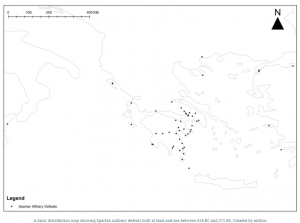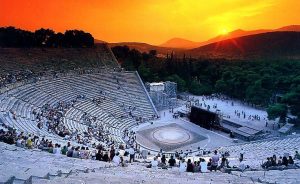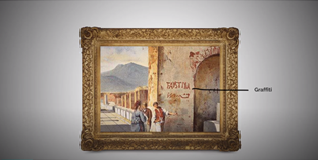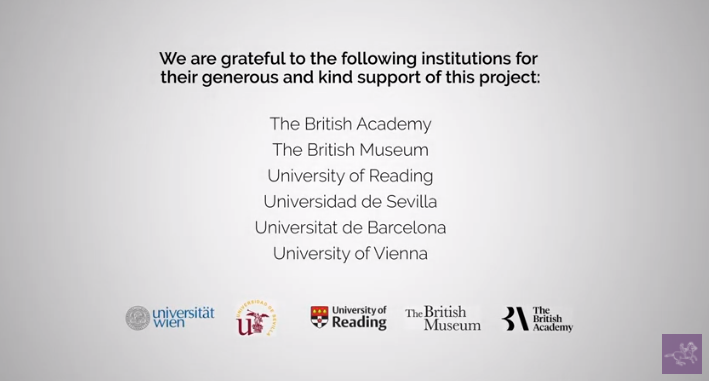
[Image of an oblique profile of an ancient marble bust of a soldier in a plumed helmet,
thought to be Spartan General Leonidas, Sparta Museum].
Author: Dr. James Lloyd-Jones. Edits: Bunny Waring.
Date: 28th May 2021.
Sparta. What image is conjured in your mind? The ancient Spartans are often seen as the venerated, the heroes of Thermopylae. But they are also the villains, the enslavers of the helots, and the supporters of eugenics. In fact, the contemporary view of the ancient Spartans as heroic macho warriors is so widespread, thanks to 300, that when we explore the Spartans in more detail, the image that appears can seem surprisingly complex and uncomfortable.

[Image showing a scenic view of the Spartan theatre as stone remains with the Taygetos mountain range in the background].
Not only do we have to deal with the complications of modern interpretations of Sparta (some of them appropriated by political extremists), but we need to tackle the complications of ancient interpretations too. With the lack of any meaningful historical narratives written by a Spartan, the evidence from Sparta itself can be bitty and difficult to interpret. For example, the Classical agora remains unexcavated, and many inscriptions are still untranslated.
The major accounts about the Spartans that do survive are written by non-Spartans such as Herodotus, Thucydides, Xenophon, Aristotle, Pausanias, and Plutarch. They come with their own interpretative issues too. Thucydides fought, and lost, against the Spartans. Xenophon was buddies with a Spartan king. Plutarch wrote nearly half a millennium after the period of Spartan hegemony and dealt in writing engaging biographies. And this is all before we get to the historiographical phenomenon known as the ‘Spartan Mirage’. We are not the only generation for whom the image of the Spartans could be decidedly one-dimensional, over-exaggerated, or dowsed in political and philosophical motives. These are all some of the juicy topics that we sink our teeth into in the third-year module “Ancient Sparta” (CL3SP for those who want to look it up).

[Image of Caitlin’s map showing the Mediterranean with marked estimated trade routes from Port Gytheion].
Studying the Spartans can be an interesting exercise in a world with increasingly complicated sources of opinions, facts, and fictions dressed as facts. So, for one of our assessments, I decided that students might benefit from a digital project that would allow them to explore a facet of Sparta that might appeal to, and be surprising for, a general audience. It also presented an opportunity to think about how we present evidence, and the importance of geography in understanding Sparta, in the form of networks, findspots, and battle sites.

[Image showing a scatter map produced by student Alfie to show patterns of spartan military defeats at land and sea between 659 – 371 BCE].
The software that we used is ArcGIS StoryMaps, and you can view some of the work that the students created in the links provided. I was really impressed across the board with the work that was turned in, especially under the trying circumstances of COVID. The examples given here represent the broad spread of topics that everyone covered. The topics range from analyses of Spartan military capabilities to helot revolts, Spartan festivals, votives, trade, colonies, and more. Each of the stories presents a compelling case for taking a more nuanced approach when we ask the question “Who were the Spartans?” and I hope that you will find something of interest in each, I know I did!
Lydia’s “The Karneia: Festival or training camp?”
Robert’s “The Best Soldiers in the World.”
Eleanor’s “An Insight into Spartan Religious Cults and Sanctuaries.”
Alfie’s “Just How Invincible Was Sparta?”
Katie’s “Motives Behind the Votives.”
Daniel’s “The impact of the Helot Revolts on Sparta.”
Katy’s “Revels and Raves: Religious festivals and celebrations in Ancient Sparta.”
Jack’s “Sparta the colonizer: Was Taras really her only colony?”
Caitlin’s “A Crack in the Spartan Trade: The Journey of Laconian Pottery.”
The “Ancient Sparta” module focused on a series of lectures and seminars, as well as some practical sessions on how to use ArcGIS StoryMaps. There was a lively movie night where we got together to watch 300 (meme competition included), as well as an introduction to some of the archaeological material from Sparta in the Ure Museum of Greek Archaeology at Reading. Finally, we were very grateful to have additional video introductions from colleagues, providing the students with some alternative viewpoints and expertise. Many thanks once again to Paul Chirstesen, Stephen Hodkinson, Tyler-Jo Smith, and Paul Cartledge for their generosity of time and knowledge.
All being well, the module is due to run next year too, when, hopefully, we might be able to do some object-handling in the Ure Museum too. There’s something quite special about being up close to an object that a Spartan dedicated in a sanctuary over 2500 years ago.



[Image of three, small metal objects thought to be cult votives made by Spartans].













 Following on from the spotlight talks, the panel moved onto considering the teaching and learning experience of Classics in relation to inclusivity, both at undergraduate level and in the context of secondary education. Participants were wowed by the eloquence of two school students (from Runshaw College in Lancashire and Pimlico Academy in London), who spoke about the perception of Classics as the subject of the privileged elite, with limited real-world application. Equally interesting was the insight from teachers from the same schools, who explained how they are reforming traditional approaches to Classics, such as by deemphasising the importance of masters and slaves and examining issues of gender in the ancient world.
Following on from the spotlight talks, the panel moved onto considering the teaching and learning experience of Classics in relation to inclusivity, both at undergraduate level and in the context of secondary education. Participants were wowed by the eloquence of two school students (from Runshaw College in Lancashire and Pimlico Academy in London), who spoke about the perception of Classics as the subject of the privileged elite, with limited real-world application. Equally interesting was the insight from teachers from the same schools, who explained how they are reforming traditional approaches to Classics, such as by deemphasising the importance of masters and slaves and examining issues of gender in the ancient world.

 What do you get if you cross cutting edge research in the ancient world with creative talent?
What do you get if you cross cutting edge research in the ancient world with creative talent? The Research Centre for Greek and Latin Literature of the Academy of Athens is delighted to invite you to the 6th online lecture of its 2020-2021 Seminar ([Self-]Praise & [Self]-Blame in Ancient Literature).
The Research Centre for Greek and Latin Literature of the Academy of Athens is delighted to invite you to the 6th online lecture of its 2020-2021 Seminar ([Self-]Praise & [Self]-Blame in Ancient Literature).
 Thank you so much for this – it’s great for us to be back for a little while, albeit virtually. All three of us share the same passion: our enthusiasm for Roman inscriptions, especially inscriptions composed in verse. To us, those inscriptions are not just stones or pieces of metal that happen to have some poetry inscribed on them. They are carriers of art. They are visible, tangible manifestations of a universal artistic practice of Roman times, spanning the empire across time and space, with thousands of examples surviving to the present day.
Thank you so much for this – it’s great for us to be back for a little while, albeit virtually. All three of us share the same passion: our enthusiasm for Roman inscriptions, especially inscriptions composed in verse. To us, those inscriptions are not just stones or pieces of metal that happen to have some poetry inscribed on them. They are carriers of art. They are visible, tangible manifestations of a universal artistic practice of Roman times, spanning the empire across time and space, with thousands of examples surviving to the present day.

 We wanted to make a number of strong, important points. About the way in which we perceive, in which we encounter the Roman world. About the way the ancient world is presented to us in museums, archives, exhibitions, and books. And we want to do so while racing a wide audience because what we have to say and offer is relevant to so many different audiences.
We wanted to make a number of strong, important points. About the way in which we perceive, in which we encounter the Roman world. About the way the ancient world is presented to us in museums, archives, exhibitions, and books. And we want to do so while racing a wide audience because what we have to say and offer is relevant to so many different audiences. We want to enthuse new generations with our passion for Roman history, for poetry, for epigraphy. We want to give teachers the opportunity to expand the canon of teaching through the inclusion of poetry that students can easily relate to. We want to invite museums, collections, and policymakers to rethink their approach to the way in which these incredibly exciting, talking objects from the ancient world are displayed. What better way to achieve this than to choose a text that expresses, in such beautiful words, the grief of pet owners – whose faithful companion had died. We feel we all can relate to that, and we feel that this text alone opens up so many new ways of thinking about the Roman world and the people who “were” the Romans, than the ever-same repertoire of classical authors.
We want to enthuse new generations with our passion for Roman history, for poetry, for epigraphy. We want to give teachers the opportunity to expand the canon of teaching through the inclusion of poetry that students can easily relate to. We want to invite museums, collections, and policymakers to rethink their approach to the way in which these incredibly exciting, talking objects from the ancient world are displayed. What better way to achieve this than to choose a text that expresses, in such beautiful words, the grief of pet owners – whose faithful companion had died. We feel we all can relate to that, and we feel that this text alone opens up so many new ways of thinking about the Roman world and the people who “were” the Romans, than the ever-same repertoire of classical authors.
 Haha, oh dear! Well… none of us are natural-born entertainers. We all were terrified and at first, we hated to see our faces and hear our recorded voices. But
Haha, oh dear! Well… none of us are natural-born entertainers. We all were terrified and at first, we hated to see our faces and hear our recorded voices. But  We hope that putting this video out there will make it available for generations to come – for pupils, teachers, academics, cultural managers, policy makers: it should entertain and be useful at the same time! It’s genuinely a piece of art.
We hope that putting this video out there will make it available for generations to come – for pupils, teachers, academics, cultural managers, policy makers: it should entertain and be useful at the same time! It’s genuinely a piece of art.


 Mairs, Rachel (Ed.) 2021. The Graeco-Bactrian and Indo-Greek World. Routledge.
Mairs, Rachel (Ed.) 2021. The Graeco-Bactrian and Indo-Greek World. Routledge.
 Marzano, Annalisa. 2021. Caesar’s triumphal banquet of 46 BC: A Hypothesis on its Political Significance on the Basis of a Recent Epigraphic Discovery from Pompeii in: politica antica 10: 99-107.
Marzano, Annalisa. 2021. Caesar’s triumphal banquet of 46 BC: A Hypothesis on its Political Significance on the Basis of a Recent Epigraphic Discovery from Pompeii in: politica antica 10: 99-107. Finglass, P.J., Kelly, A. (Eds.) 2021. The Cambridge Companion to Sappho. Cambridge University Press. With chapters by Harloe, K, Goff, B.
Finglass, P.J., Kelly, A. (Eds.) 2021. The Cambridge Companion to Sappho. Cambridge University Press. With chapters by Harloe, K, Goff, B.



 [Dr Mayorga and Assistant Curator of the Ure Museum Jayne Holly on a research trip. Mayorga.]
[Dr Mayorga and Assistant Curator of the Ure Museum Jayne Holly on a research trip. Mayorga.]




